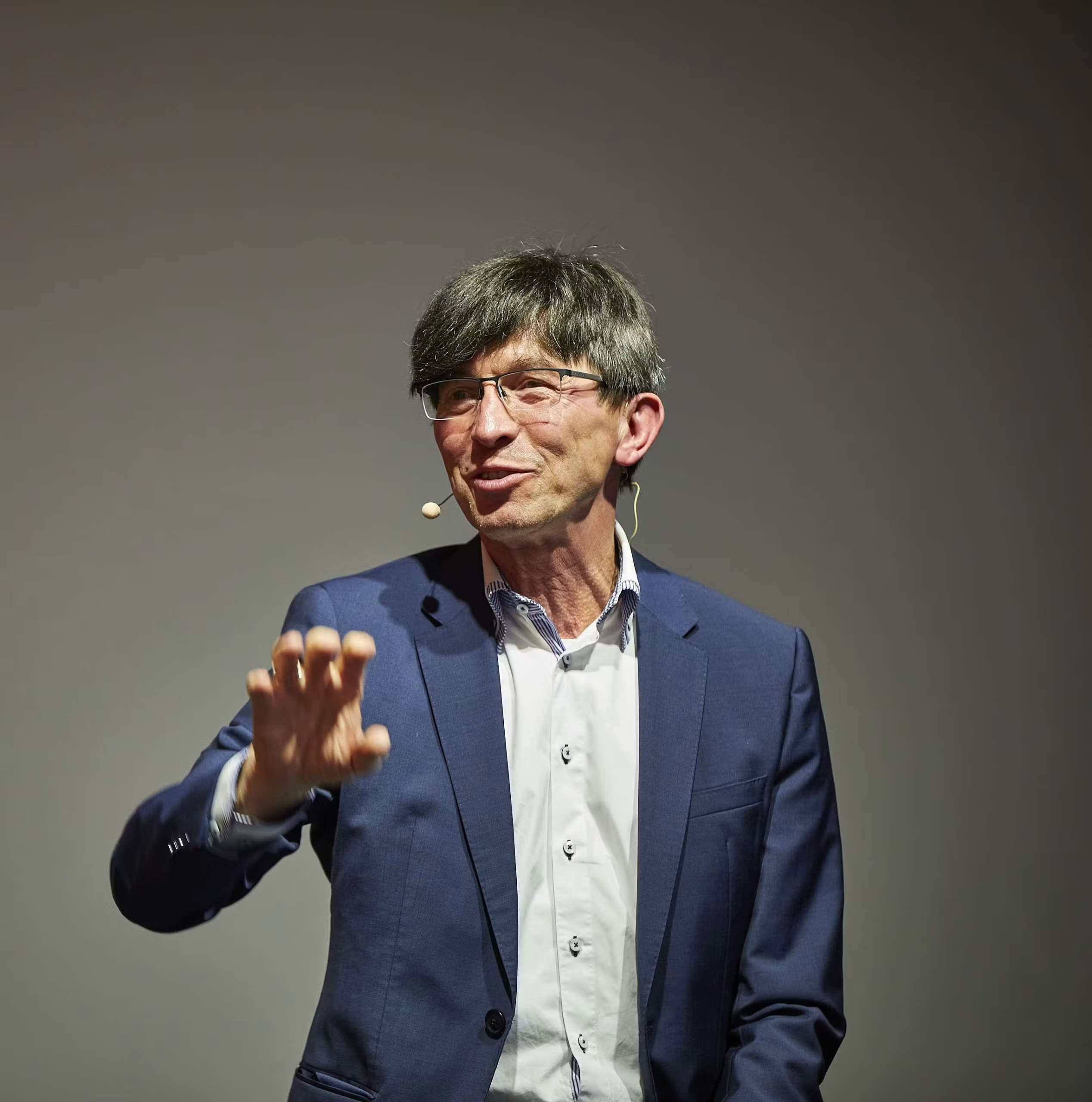Interview with Professor Dr. Gunther Olesch (Managing Director Gunther Olesch Performance, formerly Managing Director and HR Manager Phoenix Contact GmbH &Co.KG)
Gunther Olesch has received the Leading HR Manager in Germany and HR Manager of the Year awards several times and has been inducted into the HR Hall of Fame.
We talked about the influence of value culture on corporate success. Prof. Olesch wrote a book entitled “Corporate success through corporate culture” in 2022.
Phoenix was the best employer 12 times during his time as Managing Director and Head of HR
Today, the company receives 18,000 applications every year, even though we do not produce in a metropolitan region
In Kununu we have a rating of 4.1, although we are also a 3-shift production company.
60 % of our employees work in production.
Prof. Olesch is critical of the New Work approach because these benefits can only be used by employees with office jobs. HR managers often focus primarily on this target group. This creates a two-class society in the workforce. The fire department can’t put out fires from the home office either.
Prof. Olesch focused on corporate success through corporate culture. He explained the comparison to a soccer coach, whose job it is to put together and train a team so that it wins. Successful companies therefore need performance managers and not feel good managers, because success can only be achieved through performance.
Everyone has to take responsibility.
We also have to learn how to deal with resistance
He has also encountered many obstacles and resistance in the course of his career.
Developing a vision for human resources in 1992 was new. I wanted us to become one of the best employers. At Phoenix Contact, most of the managers are engineers, so the understanding of this was not so high at first. They were primarily concerned with producing the best products.
In 1998, the vision had still not been realized and I was already about to give up. “For me, role models were always companies that were managed in a visionary way,” says Prof. Olesch. A quote from Steve Jobs helped me: “Its not a shame to fall, it’s only a shame not to stand up again”!
In 2000, Prof. Olesch joined the management of Phoenix Contact. His areas of responsibility – Human Resources, Information Technology and Legal Department – were now directly anchored in the management. This was a great advantage, as it gave HR greater leverage.
We then developed corporate values that we wanted to live by within the company. This also applied to the management; we were role models who had to exemplify values.
We need
– intrinsic motivation, as a personal trait, and
– extrinsic motivation, which is generated by external influences.
Corporate culture must be lived – there is a lot of lying, especially when it comes to corporate culture development. If it is not positively perceptible, there is no good corporate culture.
If a company thinks that our employees are the focus of attention, I look at Kununu. It’s not true if the score there is 2.8
Our vision is like the North Star, it provides orientation
We have had an employee survey every two years since 1992 (with Top Job). I also had to push through the surveys against resistance at first. In the beginning, only a few managers found it interesting. We started with these teams.
If an employee who has taken part in the survey then tells an employee from another team about the positive effect, the pressure also comes from below. Employees wanted to take part.
We have always been committed to clarifying the deficits, making “diagnoses” and developing “therapies” based on the needs of the employees.
Over time, we were able to achieve 81% approval.
We have constantly worked on improvements
We have spoken openly about what we do and what we don’t do.
A lot of communication was necessary, including in the employee magazine and on the intranet
We also communicated a great deal about why the survey is so important. Also from the management at staff meetings.
Employee participation was thus increased from 57% to 75%, with over 24,000 employees worldwide.
We have been participating in Top Job since 2004. At the beginning, we were far behind the participating companies.
We were in 1st place in 2006, 2008 and 2011
We then worked with Great Place to Work to offer the surveys worldwide in all national languages.
In various employer competitions, we ultimately achieved the following:
12 times 1st place
6 times 2nd place
4 times 3rd place
It is important to Prof. Olesch that the focus on corporate culture is reflected in concrete, measurable indicators:
In 2022, only 74% of all jobs in Germany could be filled due to demographic trends
“At Phoenix Contact it was 95%, we are faster and more innovative,” emphasizes Prof. Olesch
The average fluctuation rate in German companies in 2022 is 11%, at Phoenix it is just 1%.
Staff turnover is the most expensive type of employee cost. When employees leave, they are often the best. It then takes 3-4 years until the new employees have the same quality.
The sickness rate in Germany in 2022 is 8%, at Phoenix it is 5.4%.
During my time at Phoenix Contact, we managed to keep personnel costs 7% lower.
Performance increases when we live culture.
Over the past 20 years, the company has grown from €600 million with 5,000 employees to €3.4 billion with 22,000 employees, making it the global market leader in its sector.
We have to prove culture every day. Culture dies if it is not lived. You also have to breathe constantly. It is not enough to take a deep breath in the morning and then refrain from breathing during the day.
Working on the vision
Where will the world be in 10 years? What contribution do we at Phoenix Contact want to make to this? What vision do we have for the company for the next 10 years?
What do we need to do to achieve the vision? So what direction do we need, what vision does the HR department need? Where do we want to go as a human resources department at Phoenix Contact? (More detailed descriptions can also be found in his book: www.guntherolesch.de)
We have various challenges that we cannot influence, we cannot change demographics. We need to maintain the same level of performance with fewer people, so we need to take a close look at AI and digitalization.
His stress tip:
Music: I make trance music, we also had our own band at Phoenix Contact www.gomusic.me
Prof. Olesch has an extremely positive attitude. He gives an example from the Dalai Lama. There are two wolves fighting in my head, the wolf of negativity and the wolf of happiness. If you are now wondering who wins: the wolf that you feed!
Prof. Olesch describes his ability to see small things. In the course of the day, I can gather many small experiences of happiness. I can consciously see small things and let them have an effect on me. It’s about being aware, being mindful.
Confucius says: When I walk, I walk. When I eat, I eat. When I sleep, I sleep – this shows us how important it is to live in the moment.
Interview with Professor Dr. Gunther Olesch (Managing Director Gunther Olesch Performance, formerly Managing Director and HR Manager Phoenix Contact GmbH &Co.KG)
Gunther Olesch has received the Leading HR Manager in Germany and HR Manager of the Year awards several times and has been inducted into the HR Hall of Fame.
We talked about the influence of value culture on corporate success. Prof. Olesch wrote a book entitled “Corporate success through corporate culture” in 2022.
Phoenix was the best employer 12 times during his time as Managing Director and Head of HR
Today, the company receives 18,000 applications every year, even though we do not produce in a metropolitan region
In Kununu we have a rating of 4.1, although we are also a 3-shift production company.
60 % of our employees work in production.
Prof. Olesch is critical of the New Work approach because these benefits can only be used by employees with office jobs. HR managers often focus primarily on this target group. This creates a two-class society in the workforce. The fire department can’t put out fires from the home office either.
Prof. Olesch focused on corporate success through corporate culture. He explained the comparison to a soccer coach, whose job it is to put together and train a team so that it wins. Successful companies therefore need performance managers and not feel good managers, because success can only be achieved through performance.
Everyone has to take responsibility.
We also have to learn how to deal with resistance
He has also encountered many obstacles and resistance in the course of his career.
Developing a vision for human resources in 1992 was new. I wanted us to become one of the best employers. At Phoenix Contact, most of the managers are engineers, so the understanding of this was not so high at first. They were primarily concerned with producing the best products.
In 1998, the vision had still not been realized and I was already about to give up. “For me, role models were always companies that were managed in a visionary way,” says Prof. Olesch. A quote from Steve Jobs helped me: “Its not a shame to fall, it’s only a shame not to stand up again”!
In 2000, Prof. Olesch joined the management of Phoenix Contact. His areas of responsibility – Human Resources, Information Technology and Legal Department – were now directly anchored in the management. This was a great advantage, as it gave HR greater leverage.
We then developed corporate values that we wanted to live by within the company. This also applied to the management; we were role models who had to exemplify values.
We need
– intrinsic motivation, as a personal trait, and
– extrinsic motivation, which is generated by external influences.
Corporate culture must be lived – there is a lot of lying, especially when it comes to corporate culture development. If it is not positively perceptible, there is no good corporate culture.
If a company thinks that our employees are the focus of attention, I look at Kununu. It’s not true if the score there is 2.8
Our vision is like the North Star, it provides orientation
We have had an employee survey every two years since 1992 (with Top Job). I also had to push through the surveys against resistance at first. In the beginning, only a few managers found it interesting. We started with these teams.
If an employee who has taken part in the survey then tells an employee from another team about the positive effect, the pressure also comes from below. Employees wanted to take part.
We have always been committed to clarifying the deficits, making “diagnoses” and developing “therapies” based on the needs of the employees.
Over time, we were able to achieve 81% approval.
We have constantly worked on improvements
We have spoken openly about what we do and what we don’t do.
A lot of communication was necessary, including in the employee magazine and on the intranet
We also communicated a great deal about why the survey is so important. Also from the management at staff meetings.
Employee participation was thus increased from 57% to 75%, with over 24,000 employees worldwide.
We have been participating in Top Job since 2004. At the beginning, we were far behind the participating companies.
We were in 1st place in 2006, 2008 and 2011
We then worked with Great Place to Work to offer the surveys worldwide in all national languages.
In various employer competitions, we ultimately achieved the following:
12 times 1st place
6 times 2nd place
4 times 3rd place
It is important to Prof. Olesch that the focus on corporate culture is reflected in concrete, measurable indicators:
In 2022, only 74% of all jobs in Germany could be filled due to demographic trends
“At Phoenix Contact it was 95%, we are faster and more innovative,” emphasizes Prof. Olesch
The average fluctuation rate in German companies in 2022 is 11%, at Phoenix it is just 1%.
Staff turnover is the most expensive type of employee cost. When employees leave, they are often the best. It then takes 3-4 years until the new employees have the same quality.
The sickness rate in Germany in 2022 is 8%, at Phoenix it is 5.4%.
During my time at Phoenix Contact, we managed to keep personnel costs 7% lower.
Performance increases when we live culture.
Over the past 20 years, the company has grown from €600 million with 5,000 employees to €3.4 billion with 22,000 employees, making it the global market leader in its sector.
We have to prove culture every day. Culture dies if it is not lived. You also have to breathe constantly. It is not enough to take a deep breath in the morning and then refrain from breathing during the day.
Working on the vision
Where will the world be in 10 years? What contribution do we at Phoenix Contact want to make to this? What vision do we have for the company for the next 10 years?
What do we need to do to achieve the vision? So what direction do we need, what vision does the HR department need? Where do we want to go as a human resources department at Phoenix Contact? (More detailed descriptions can also be found in his book: www.guntherolesch.de)
We have various challenges that we cannot influence, we cannot change demographics. We need to maintain the same level of performance with fewer people, so we need to take a close look at AI and digitalization.
His stress tip:
Music: I make trance music, we also had our own band at Phoenix Contact www.gomusic.me
Prof. Olesch has an extremely positive attitude. He gives an example from the Dalai Lama. There are two wolves fighting in my head, the wolf of negativity and the wolf of happiness. If you are now wondering who wins: the wolf that you feed!
Prof. Olesch describes his ability to see small things. In the course of the day, I can gather many small experiences of happiness. I can consciously see small things and let them have an effect on me. It’s about being aware, being mindful.
Confucius says: When I walk, I walk. When I eat, I eat. When I sleep, I sleep – this shows us how important it is to live in the moment.





